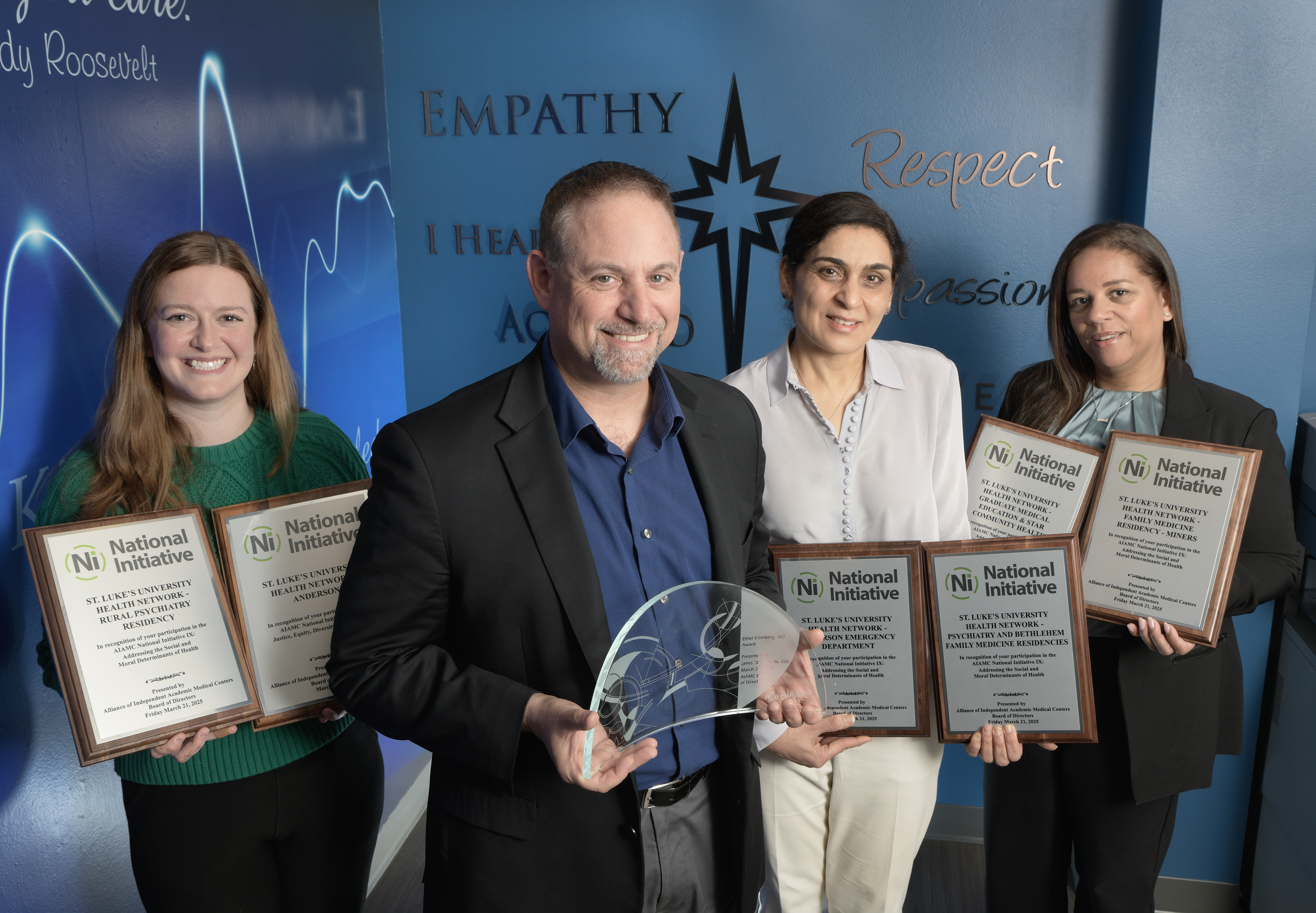First Graduate of New Hospice and Palliative Medicine AP Fellowship
December 20, 2023

This fall Mikala Leszcynski earned the distinction of becoming the first graduate of St. Luke’s new Hospice and Palliative Medicine Advanced Practitioner (AP) Fellowship program. This yearlong program – which St. Luke’s University Health Network launched in August 2022 – equips qualified, committed and caring nurse practitioners and physician assistants with the clinical and academic expertise to become future leaders in hospice and palliative medicine.
St. Luke's Hospice and Palliative Medicine AP Fellowship program is the first one in Pennsylvania and the 13th in the country.
“As the first to graduate from the AP program, I am especially grateful for the people who built it from the ground up. I hope to have left a positive impression of all this program has to offer. I am confident that the AP fellowship will allow future fellows to learn the intricacy of this specialty and further benefit the growth of palliative care and hospice and I am eager to see how this program continues to grow and evolve,” says Leszcynski, who grew up in Nazareth.
Jennifer Bloch, MSN, CRNP, ACHPN, says that Leszcynski’s accomplishment is a point of pride for the new program.
“We were so excited when Mikala completed the fellowship and was so successful. She had come in as a new college grad, which is a scary place to be with just getting out of school and having a lot of book knowledge, but not a lot of hands-on patient care,” says Bloch, Lead Advanced Practitioner, Program Director, Palliative Medicine and Hospice APC Fellowship.
“Over the course of her year with us, she became a confident, independent provider who felt comfortable managing her patients’ symptoms as well as assisting them in making decisions about their goals of care and helping guide them through their illness while improving their quality of life.”
In training advanced practitioners, the St. Luke’s Hospice and Palliative Medicine AP Fellowship program is helping to address the ongoing shortage of hospice and palliative medicine providers in the face of the aging of the U.S. population, many of whom are living with chronic or serious illnesses.
“The actual throughput of physicians graduating in hospice and palliative medicine has not really changed over the last decade, so we're seeing a huge national shortage of these providers,” explains Erin M. Bendas, DO, St. Luke’s Section Chief for Palliative and Supportive Care and Associate Program Director for the Physician Hospice and Palliative Medicine Fellowship program.
“Our thought in creating this program was to help put more providers into the community, not only in the Lehigh Valley, but throughout the East Coast and nationally. We have physician fellows spanning the country. We teach our fellows to not only take care of these patients, but also to be leaders in our community to ensure that we are growing the provider base to take care of our population as it ages.”
The St. Luke’s Hospice and Palliative Medicine AP Fellowship program provides its participants with expertise in managing primary and complex issues in hospice and palliative medicine, focusing on symptom management and communication skills. Advanced practitioners in this program work with members of St. Luke’s hospice and palliative team and train side-by-side with physician fellows in the Network’s hospice and palliative medicine physician fellowship program.
The St. Luke’s Hospice and Palliative Medicine AP Fellowship program’s curriculum includes modules in all of the specialties that care for chronically ill patients, including oncology, behavioral health and neurology as well as completing rotations in St. Luke’s various intensive care units.
By allowing its fellows time in these specialties, St. Luke’s is not only expanding their knowledge base, but it is also giving them the confidence to interact comfortably with patients and their families in a supportive environment with a strong emphasis on mentorship.
“Frequently, our patients are suffering with chronic illness, such as chronic obstructive pulmonary disease, congestive heart failure and cancer. Medications are given to manage the disease or slow the progression of the illness, but not the symptoms. So our team will come in and help our patients be comfortable, ensuring they have good quality of life while the disease is being managed,” Bloch explains.
“With palliative medicine, our patients can continue treatment. If it's time for us to be considering hospice, then we're educating our fellows on how to provide good end-of-life care, making sure our patients are comfortable.”
As a student in DeSales University’s physician assistant program, Leszcynski learned about palliative care and hospice, and she became passionate about and drawn to what these specialties could offer to patients experiencing serious illness.
“It is such an important aspect of healthcare and I wanted to learn everything I could about these fields,” recalls Leszcynski, who earned a Bachelor of Science in Medical Studies and a Master of Science in Physician Assistant Studies from DeSales.
“I chose to complete my elective clinical rotation at DeSales with palliative care and hospice. During this time, I learned about the St. Luke’s AP Fellowship beginning right after my graduation. This immediately felt like the right path. I had grown even more passionate about the field during my rotation and knew there was so much more to learn. The AP fellowship was exactly what I was looking for to further my knowledge.”
During the AP fellowship, Leszcynski had the opportunity to give lectures at educational sessions provided by the palliative medicine and hospice teams at St. Luke’s. She also attended the Annual Assembly of Hospice and Palliative Medicine conference in Montreal, where she learned about the most recent palliative care and hospice research.
“Afterward,” Leszcynski says, “I was able to bring this experience back to St. Luke’s to discuss the research with my team.”
One unique aspect of the St. Luke’s Hospice and Palliative Medicine AP Fellowship program that Leszcynski says she will carry throughout her career is Dame Cicely Saunders’ concept of “total pain.”
Leszcynski explains that as the founder of the first modern hospice, Dame Cicely Saunders described the suffering associated with serious illness as multidimensional, not only affecting a person physically, but also psychologically, socially and spiritually.
“By working with the palliative care and hospice teams, I have gained a better understanding of this concept so I can treat my patients with even more compassion. When I speak with a patient experiencing serious illness, I am able to consider the multidimensionality of the patient, rather than focusing on their illness alone,” she notes.
Now, as an AP fellow, Leszcynski’s career opportunities are expanded because of her specialized experience in this field of medicine. She is relocating to Syracuse, N.Y., for a position in rehabilitation and long-term care.
“I had the opportunity to discuss the skills and knowledge I gained during the fellowship with multiple potential employers,” she notes. “As palliative care and hospice are often integral to other specialties, I was able to become a more versatile candidate with my fellowship training.”
As she travels north, Leszcynski carries with her the advanced knowledge and experience and the continued support of the St. Luke’s Hospice and Palliative Medicine AP Fellowship program.
Adds Bloch: “It's a very supportive environment. For a fellow, that's something that you have to have to be successful. There has to be somebody for you to call and feel comfortable asking those questions. It's something that we offer that I think a lot of teams may not.”
More information about St. Luke’s Hospice and Palliative Medicine AP Fellowship program is available by visiting the St. Luke’s website or emailing Jennifer Bloch at or Erin Bendas, DO.
Read More NewsLatest News


April 10, 2025
National Recognition for SLUHN Graduate Medical Education

April 09, 2025
In Safe Hands Award

April 08, 2025